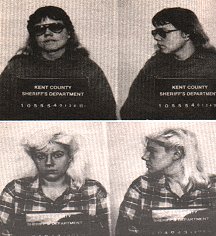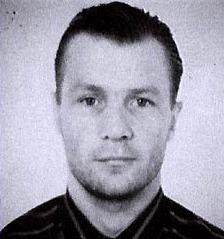
Andrei Romanovich Chikatilo was a Ukrainian-born Soviet serial killer nicknamed the Butcher of Rostov, the Rostov Ripper, and the Red Ripper who sexually assaulted, murdered, and mutilated at least fifty-two women and children between 1978 and 1990 in the Russian SFSR, the Ukrainian SSR, and the Uzbek SSR.

Gwendolyn Gail Graham and Catherine May Wood are American serial killers convicted of killing five elderly women in Walker, Michigan, a suburb of Grand Rapids, in 1987. They committed their crimes in the Alpine Manor nursing home, where they both worked as nurse's aides.

Alexander Viktorovich Solonik was a Russian gangster, known for his reputation as a notorious hitman in the Russian criminal underworld. Also known as Sasha-Macedonian, Alexander the Great and Superkiller, Solonik was involved in Russian Mob activity for much of the 1990s until disappearing after his second escape from prison. Solonik was found dead in Athens, Greece, in 1997.
The Wichita Massacre, also known as the Wichita Horror, was a week-long violent crime spree perpetrated by brothers Reginald and Jonathan Carr, in the city of Wichita, Kansas, between December 8 and 15, 2000. Five people were killed, and two people, a man and a woman, were severely wounded. The brothers were arrested and convicted of multiple counts of murder, kidnapping, robbery, and rape. They were both sentenced to death in October 2002. Their vicious crimes created panic in the Wichita area resulting in an increase in the sales of guns, locks, and home security systems.

The Dnepropetrovsk maniacs are Ukrainian serial killers responsible for a string of murders in Dnepropetrovsk (Dnipropetrovsk) in June and July 2007. The case gained additional notoriety because the killers made video recordings of some of the murders, with one of the videos leaking to the Internet. Two 19‑year-olds, Viktor Sayenko, born 1 March 1988, and Igor Suprunyuk, born 20 April 1988, were arrested and charged with 21 murders.

Anatoly Viktorovich Utkin was a Soviet serial killer, convicted for the killing of nine people in Ulyanovsk Oblast and Penza Oblast between 1968 and 1973.
Viktor Viktorovich Sotnikov is a Russian serial killer, convicted for the killing of 8 people in Lipetsk Oblast and Tambov Oblast between 2000 and 2011.
On August 20, 2016, a mass killing occurred in Citronelle, Alabama, United States, resulting in the deaths of five people, including a woman who was five months pregnant. They were killed in the early morning in a private residence in a rural area west of the city. It was owned by a brother of Laneta Lester, who had sought refuge there. She and her brother's infant were abducted and taken to Leakesville, Mississippi, by her estranged boyfriend, Derrick Dearman. He released her that day. Lester returned with the infant to Citronelle. She notified police of the killings. Investigators described this mass killing as the worst in Mobile County's history. The house burned down a couple of weeks after the crime.

Mikhail Viktorovich Popkov is a Russian serial killer, rapist, and necrophile who committed the sexual assault and murder of eighty-three girls and women between 1992 and 2010 in Angarsk, Irkutsk, in Siberia, and Vladivostok in Far East, although he has confessed to and is suspected of at least eighty-six in total. He is known as "the Werewolf" and "the Angarsk Maniac" for the particularly brutal nature of his crimes; he would extensively mutilate the bodies of his victims and perform sexual acts on them. Popkov was also known as "the Wednesday Murderer" due to bodies of his victims usually being found on Wednesdays. He is the single most prolific serial killer in Russian history.
Sergey Aleksandrovich Shipilov, known as The Velsk Chikatilo, is a Russian rapist and serial killer sentenced to life imprisonment for 14 murders and nine rapes. Most of his murders took place in the town of Velsk. The majority of his victims were women that he raped before killing.
Viktor Viktorovich Fokin, known as The Pensioner Maniac, was a Russian serial killer who killed at least 10 people in between 1996 and 2000.
Oleg Viktorovich Rylkov, known as The Tolyatti Ripper, is a Russian serial killer, rapist and pedophile. Between 1992 and 1997, he raped 37 underage girls and killed 12 people in the city of Tolyatti, in the Samara Oblast.
Vladimir Viktorovich Mirgorod, known as The Strangler, is a Russian serial killer who killed 18 people from 2002 to 2004. He was detained in 2010, when his fingerprints matched with those found at the crime scenes. In 2012, he was sentenced to life imprisonment.
Vladimir Viktorovich Storozhenko, known as The Smolensk Strangler, was a Soviet serial killer.

Eduard Evgenevich Lykov was a Russian-born Belarusian criminal and serial killer, responsible for five murders between 2002 and 2011. Despite concerns from human rights activists over his possible Russian citizenship, his drunken state during the murders, and his petition for clemency, Lykov was sentenced to death by the Minsk Regional Court, and subsequently executed in 2014.
Dmitry Valerievich Lebed, known as The Abakan Strangler, is a Russian serial killer and rapist who operated in the Khakassian city of Abakan and its surrounding areas. Using rented cars and pretending to be a taxi driver, he raped at least 12 women, at least 5 of whom he successfully murdered. Shortly following his arrest for the murder of 24-year-old Oksana Litvinova, he confessed to other crimes for which he received life imprisonment at a special regime colony.
Viktor Mikhailovich Selikhov, known as The Naked Demon, was a Soviet serial killer and rapist who, between 1962 and 1964, attacked numerous young girls and women in the Kirghiz SSR's Chuy Region, raping at least 10 and killing 3 of his victims. Noted for his peculiar appearance while committing the crimes, he was arrested, convicted and subsequently executed in 1965.
Alexey Vladimirovich Gromov, known as The Bluebeard, is a Russian serial killer who killed three common-law wives and one of their mothers between 2006 and 2011, after being released for a previous murder in 1994 for which he served 10 years. For his later killings, Gromov was found guilty and sentenced to life imprisonment.
Alexey Arkadyevich Mikhalenya was a Belarusian serial killer and criminal who killed five people in the Gomel Region from 2002 to 2016, three of which were committed while he was still a teenager. For his latter murders, he was sentenced to death and subsequently executed in 2018.
Igor Viktorovich Churasov, known as The Scavenger of Humanity, is a Russian serial killer and cannibal who murdered seven people in Ryazan from 1997 to 2000, five with his accomplice Gennady Shurmanov. He earned his nickname from the fact that he ate some of his victims' remains after dismembering them.






